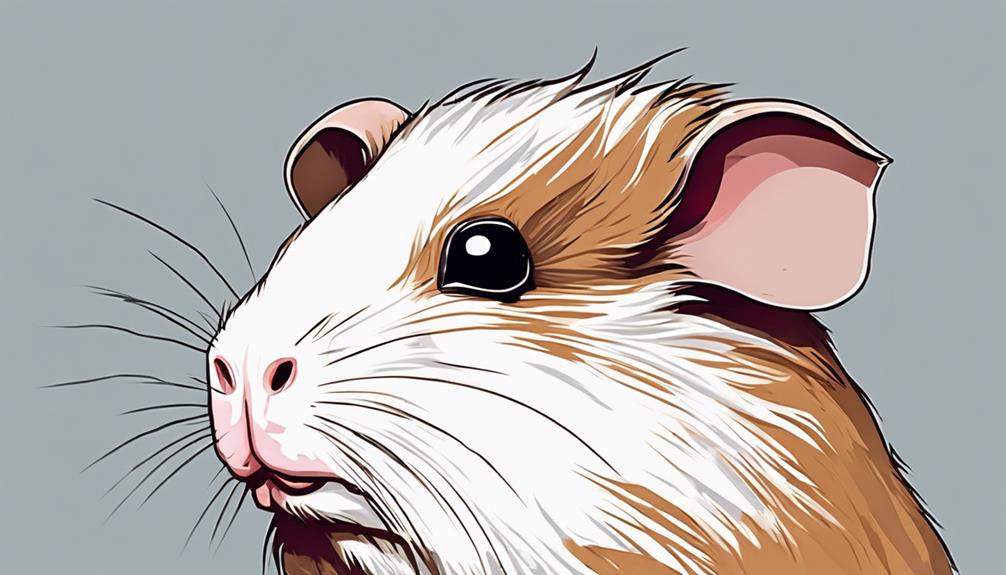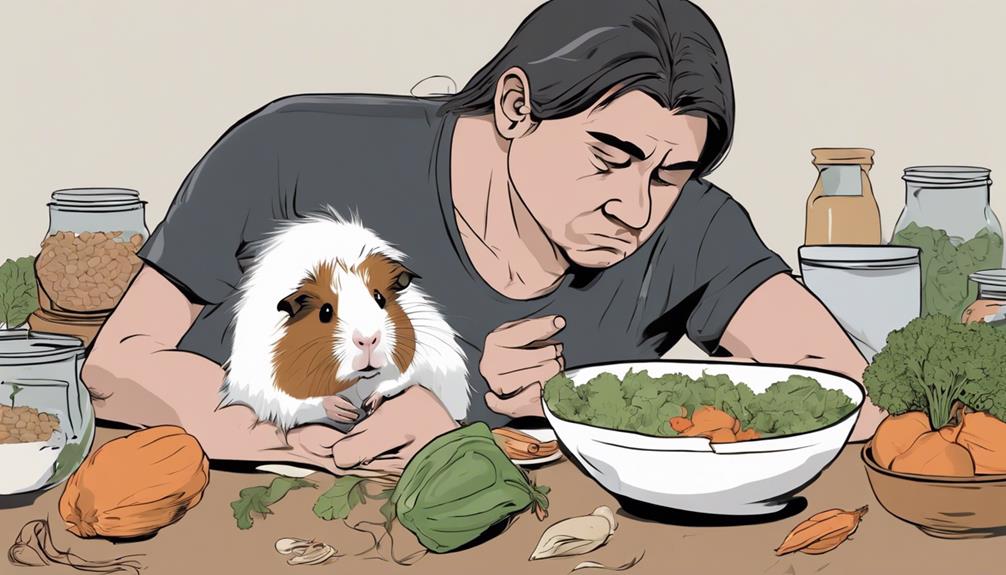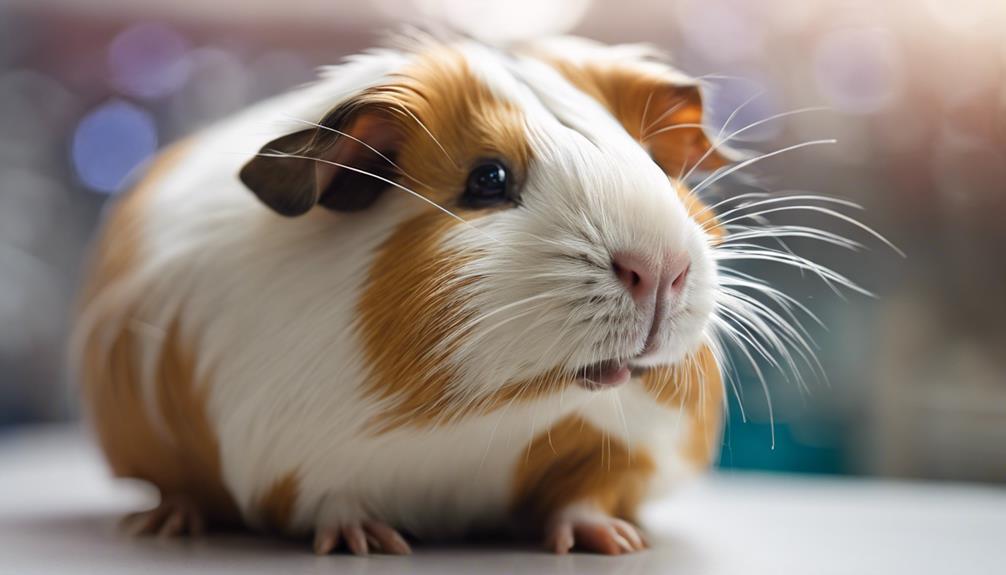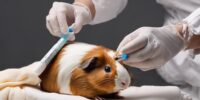When to Seek Emergency Care for Your Guinea Pig

When to Seek Emergency Care for Your Guinea Pig:
Signs of respiratory distress, sudden behavior changes, or any unusual symptoms warrant immediate veterinary attention to ensure your pet's well-being.
Time is of the essence in safeguarding your guinea pig's health, so act promptly if you notice any concerning signs.
Key Takeaways
- Loss of appetite or breathing difficulties require immediate veterinary attention.
- Diarrhea or seizures indicate urgent need for professional care.
- Behavior changes like lethargy or aggression signal potential health issues.
- Prompt intervention for any abnormality ensures your guinea pig's well-being.
Signs of Respiratory Distress
Recognizing signs of respiratory distress in your guinea pig is important for prompt and effective intervention. Guinea pigs are prone to respiratory issues, which can escalate quickly if not addressed promptly. If you notice your guinea pig having difficulty breathing, wheezing, sneezing frequently, or displaying nasal discharge, it may be experiencing respiratory distress. In such cases, seeking veterinary care immediately is essential.
When it comes to treatment options, a veterinarian will typically prescribe antibiotics to treat respiratory infections in guinea pigs. It's essential to follow the prescribed treatment plan diligently to guarantee the best possible outcome for your pet. Additionally, providing a clean and dust-free environment for your guinea pig can help prevent respiratory issues from developing. Regularly cleaning the cage, ensuring proper ventilation, and avoiding exposure to cigarette smoke are all key prevention strategies to keep your guinea pig healthy and happy.
Sudden Changes in Behavior
Sudden changes in behavior in your guinea pig should never be ignored, as they can indicate underlying health issues that require immediate attention. Observing your pet for any unusual behavior is vital in maintaining their well-being. Guinea pigs are known for their predictable routines, so any deviation from their usual activities could signal a problem. Keep a close eye on changes in appetite, as a sudden decrease or increase could be a red flag. Additionally, watch out for any alterations in their usual behavior patterns, such as increased lethargy, aggression, or vocalizations. These shifts could be indicative of discomfort or distress.
When you notice any of these signs, it's essential to seek prompt veterinary care to address the underlying issue. Delaying treatment could worsen your guinea pig's condition and lead to further complications. Remember, your furry friend's well-being is of utmost importance, and swift action in response to changes in behavior can make a significant difference in their health outcomes.
Loss of Appetite

Noticing a decline in appetite in your guinea pig demands immediate attention, as it may signify a critical health issue that requires urgent veterinary care. Guinea pigs are known for their constant need to eat, so any deviation from their regular eating habits could be a cause for concern.
When faced with a guinea pig that refuses to eat, consider the following possibilities:
- Nutritional deficiencies, which can lead to a weakened immune system and other health complications.
- Dental problems, such as overgrown teeth or dental malocclusion, which can make eating painful for your guinea pig.
- Underlying health issues like infections or gastrointestinal problems that may be affecting your pet's appetite.
Failure to address the underlying cause of your guinea pig's loss of appetite promptly could result in severe consequences. Seeking veterinary care to diagnose and treat the root of the issue is critical in restoring your guinea pig's health and well-being.
Diarrhea or Bloody Stool
The presence of diarrhea or bloody stool in your guinea pig warrants immediate veterinary assessment to address potential health risks and guarantee timely treatment. These symptoms can indicate serious underlying conditions that require prompt attention. In cases of diarrhea, dehydration prevention and treatment are vital.
Make sure your guinea pig has access to fresh water at all times and consider providing electrolyte solutions recommended by your veterinarian. Dietary considerations play a significant role in managing diarrhea or bloody stool. Offer easily digestible foods such as hay and fresh vegetables while avoiding sugary treats or foods high in fat. Monitor your guinea pig's intake and consult with a vet for tailored dietary recommendations.
Difficulty Breathing

Seek immediate veterinary attention if your guinea pig shows signs of struggling to breathe. Difficulty breathing in guinea pigs can indicate serious health issues that require prompt intervention. When faced with respiratory distress in your furry companion, it's vital to act swiftly to guarantee their well-being.
Here are essential points to contemplate regarding breathing difficulties in guinea pigs:
- Breathing difficulties, treatment options: Respiratory problems in guinea pigs can be caused by various factors such as infections, allergies, or heart conditions. Treatment options may include medications like antibiotics, bronchodilators, or even oxygen therapy depending on the underlying cause.
- Respiratory distress, prevention tips: To prevent breathing issues in guinea pigs, maintain a clean living environment, provide adequate ventilation, and avoid exposure to cigarette smoke or strong fumes. Regular veterinary check-ups can also help detect any potential respiratory problems early on.
Taking proactive steps and recognizing the signs of respiratory distress can significantly impact your guinea pig's health and quality of life.
Injuries or Wounds
When it comes to caring for a guinea pig, injuries or wounds should never be taken lightly. Severe bleeding or infection, limb or bone injuries, and deep puncture wounds are serious concerns that require immediate attention.
Ignoring these issues can lead to further complications and jeopardize the well-being of your beloved pet.
Severe Bleeding or Infection
In cases of severe bleeding or infection in guinea pigs, swift action is essential to prevent further complications. When faced with such a situation, it's vital to act promptly and decisively.
Here are key steps to address severe bleeding or infection in guinea pigs:
- Provide Emergency First Aid: Stop the bleeding by applying gentle pressure to the wound with a clean cloth. Seek immediate veterinary assistance for further treatment.
- Initiate Wound Treatment: Clean the wound with a mild antiseptic solution to prevent infection. Avoid using products that may be toxic to guinea pigs.
- Monitor for Signs of Infection: Keep a close eye on the wound for any signs of redness, swelling, or discharge. Contact a veterinarian if you notice any concerning changes.
Limb or Bone Injury
Upon discovering a limb or bone injury in your guinea pig, immediate assessment and appropriate care are essential to ensuring its well-being. Proper fracture treatment and pain management are vital in alleviating discomfort and aiding the healing process. Additionally, considering rehabilitation options and understanding the expected recovery timeline can contribute greatly to your guinea pig's recovery journey. Below is a table summarizing key aspects to take into account when dealing with limb or bone injuries in your beloved pet:
| Aspect | Description |
|---|---|
| Fracture treatment | Seek veterinary care for diagnosis and potential splinting or surgery |
| Pain management | Administer prescribed pain medication and monitor for improvement |
| Rehabilitation options | Include physical therapy or exercises as advised by the vet |
| Recovery timeline | Follow the vet's guidance on healing time and progress monitoring |
Deep Puncture Wounds
Discovering a deep puncture wound on your guinea pig necessitates immediate attention to prevent complications and guarantee proper healing. These types of wounds can quickly become infected and lead to serious health issues if left untreated. Here is what you should do:
- First aid: Begin by gently cleaning the wound with a mild antiseptic solution to prevent infection.
- Wound care: Apply a small amount of antibiotic ointment to the wound to promote healing and prevent further infection.
- Veterinary care: It's essential to seek professional veterinary care as soon as possible to assess the wound, provide any necessary treatment, and make sure your guinea pig receives proper care.
Seizures or Tremors
If your guinea pig experiences sudden seizure activity or uncontrollable shaking episodes, it's vital to seek emergency veterinary care immediately. These symptoms can indicate serious underlying health issues that require prompt attention to guarantee the well-being of your pet.
Don't delay in getting professional help if you observe such concerning behavior in your guinea pig.
Sudden Seizure Activity
In cases of sudden seizure activity in guinea pigs, immediate veterinary attention is crucial to guarantee proper diagnosis and treatment. Seizures can be alarming and may indicate underlying neurological issues that require timely intervention.
When faced with a guinea pig experiencing sudden seizure activity, consider the following:
- Observe the Seizure: Note the duration and intensity of the seizure for the veterinarian.
- Avoid Disturbing the Guinea Pig: Keep the environment calm to prevent further stress.
- Seek Veterinary Assistance: Contact a qualified veterinarian experienced in treating small animals promptly.
Understanding the potential causes of seizures and having a proactive approach can aid in effective treatment and potentially prevent future episodes.
Uncontrollable Shaking Episodes
When faced with uncontrollable shaking episodes in your guinea pig, how can you guarantee prompt and appropriate care? Seizures or tremors can be distressing, but there are essential steps to take.
First, guarantee your pet's safety by placing them in a quiet, dimly lit area free from hazards.
Next, seek veterinary guidance promptly. Treatment options may include medications to manage seizures or tremors. Your vet can provide guidance on long-term care and management strategies tailored to your guinea pig's needs.
Additionally, preventive measures such as a balanced diet, regular veterinary check-ups, and a safe environment can aid in reducing the frequency or severity of shaking episodes.
Emergency Vet Visit
During episodes of seizures or tremors, immediate veterinary attention is vital to guarantee the well-being of your guinea pig. Seeking emergency care promptly can help identify and address the underlying causes of these distressing symptoms.
Here are some reasons why an emergency vet visit is necessary:
- Proper Diagnosis: Veterinarians can conduct thorough examinations to determine the root cause of the seizures or tremors.
- Treatment Options: Professional guidance ensures appropriate treatment plans are implemented promptly.
- Preventive Measures: Vets can provide guidance on preventing future episodes, such as addressing dental issues and skin problems effectively.
Unexplained Weight Loss
Should your guinea pig experience unexplained weight loss, promptly consult a veterinarian to address potential underlying health concerns. Unexplained weight loss in guinea pigs can be indicative of various health issues that require immediate attention. Nutritional deficiencies, such as a lack of vitamin C or inadequate access to fresh hay, can lead to weight loss in guinea pigs. Ensuring a balanced diet important for your pet's well-being.
Parasitic infections are another common cause of unexplained weight loss in guinea pigs. Parasites like mites or lice can disrupt your pet's digestive system, leading to weight loss and other health complications. Regularly checking your guinea pig for signs of parasites and seeking proper treatment can help prevent weight loss due to parasitic infections.
Frequently Asked Questions
Can Guinea Pigs Experience Allergic Reactions That May Require Emergency Care?
Guinea pigs can indeed experience allergic reactions that may necessitate emergency care. Timely treatment is crucial in such cases to prevent severe complications. Owners should be vigilant for symptoms and seek immediate veterinary assistance when needed.
How Can I Best Prepare for a Potential Emergency Situation With My Guinea Pig?
In the domain of pet care, being ready for the unexpected is as crucial as a shield to a warrior. Assemble an emergency kit, learn signs, symptoms of distress. Preparation is key to safeguarding your guinea pig's well-being.
Are There Any Specific First Aid Measures I Should Take Before Seeking Emergency Care for My Guinea Pig?
In responding to a guinea pig emergency, first aid techniques play an essential role. Swiftly applying appropriate measures can greatly help before seeking professional care. Knowing these steps beforehand guarantees a timely and effective emergency response.
Can Stress or Environmental Changes Trigger Emergency Health Issues in Guinea Pigs?
In the delicate world of guinea pigs, stress triggers can lead to unforeseen health issues, while sudden environmental changes might propel these furballs into the kingdom of requiring urgent emergency care. Stay vigilant, guardian.
Are There Any Common Household Items or Foods That Can Be Toxic to Guinea Pigs and Require Immediate Attention if Ingested?
To protect your guinea pig's well-being, be mindful of common household dangers. Toxic plants like lilies and harmful foods such as chocolate can pose serious risks. Immediate vet care is essential if ingested to guarantee their health.











